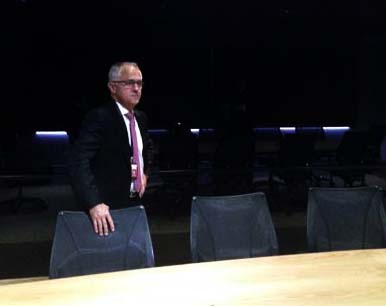Telstra will build the NBN sooner: Turnbull

Signing up the incumbent telecommunications giant Telstra to build fibre-to-the-node for NBN Co out to 206,000 premises will ensure the project is completed sooner, according to Communications Minister Malcolm Turnbull.
This morning Turnbull announced that NBN Co and Telstra had entered an agreement for Telstra to build and construct a fibre to the node network out to 1,000 nodes and 206,000 premises across locations of regional Queensland and New South Wales.
In an interview with ZDNet this afternoon, Turnbull said that Telstra will retain ownership of the copper as part of this agreement, which will ultimately feed into the renegotiated definitive agreements between NBN Co and Telstra.
"The copper will remain the property of Telstra pending the conclusion of the renegotiations. What this is, is really getting on with the job and making sure that we're not waiting to kick-start the fibre to the node part until the ink is dry on the amendments to the definitive agreements with Telstra," Turnbull said.
Turnbull said that the value of the deal was commercial in confidence, however reports have placed the deal between AU$100 million and AU$150 million. The minister said that it was "in the envelope" of the estimated cost of deploying fibre to the node outlined in NBN Co's strategic review completed last year.
"It's within the assumptions in the strategic review for what it would cost to do fibre to the node," he said.
This includes maintenance costs for the existing copper lines that NBN Co will need between the node and each premises, Turnbull confirmed.
The decision to proceed with the fibre-to-the-node rollout comes as the government has yet to release the independent panel's cost-benefit analysis that Turnbull had originally said would determine whether the government would proceed with a fibre-to-the-node deployment. He said that the report would still play a role, but the locations picked were suitable for the technology choice.
"The cost-benefit analysis will feed into the deployment strategy, but these are all areas where if you were going to do any fibre to the node, you would do it," he said.
"We're very alert to the factors that determine whether you go fibre to the node or fibre to the premises, and I recognise there will be precincts where you can argues one way or the other.
"These are areas that are very suitable for fibre to the node, and where you can achieve a very good outcome in terms of line speed and service quality very quickly by doing it."
Turnbull said the aim was to have the first 206,000 premises connected to the NBN in 12 months, with the NBN-Telstra agreement finalised before then.
"It's very much on track and the lawyers are steaming away writing long documents even as we speak," he said.
"The idea is that we'll get the amendments to the definitive agreements signed later in the year, hopefully. We're very confident about that and then the larger scale fibre-to-the-node rollout will proceed. This is like the first wave of the fibre-to-the-node deployment.
"It's designed to get the engine working so that you've got 1,000 plus nodes being deployed, and then that will just continue to ramp up over the next few years."
He said that there would be no trial of getting wholesale access to the HFC networks owned by Telstra and Optus prior to the renegotiation.
"I think operating it as a wholesale platform is not unique or special. There are plenty of examples of that," he said.
"The HFC is a very proven broadband technology. The bottom line is the DOCSIS is one of the largest, if not the largest platforms for broadband. And like the DSL technologies, it keeps on getting better."
Optus and Vodafone have recently warned of Telstra's growing market power in the telecommunications industry, fueled by its work with the government. Turnbull said signing the incumbent telco up to build the node network was not something out of the ordinary.
"Working with the incumbent telco to build the network isn't revolutionary. It's happening in just about every other market," he said.
"We just want to get the thing built. That's the bottom line — with Telstra you're going to get it built a lot sooner."
